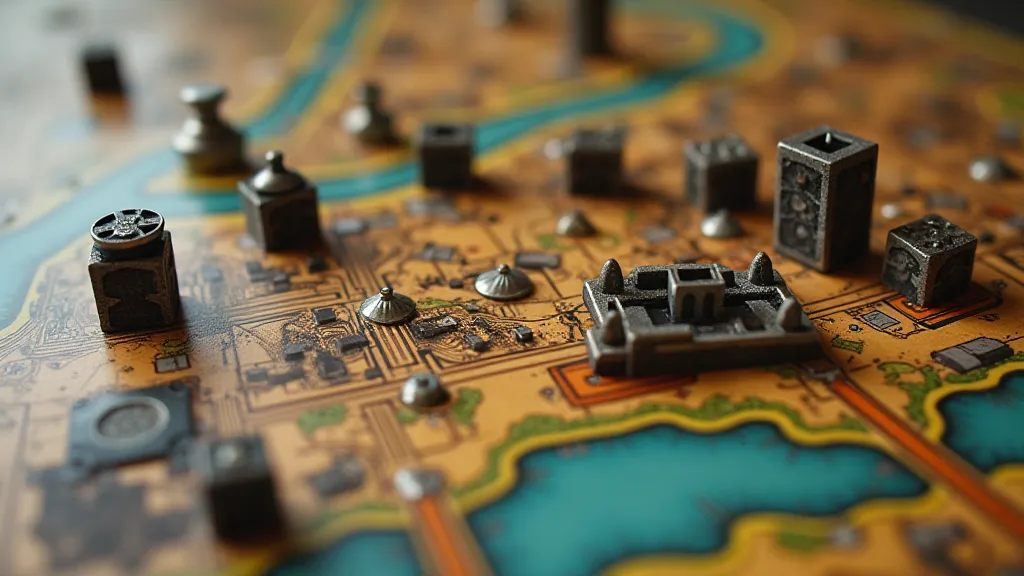Brass: Birmingham - Economic Engine Building
Brass: Birmingham is a highly regarded economic strategy game where players compete to establish industries and develop infrastructure in 18th-century Birmingham and the surrounding Black Country. It’s more than just placing tiles; it's a complex puzzle of resource management, timing, and anticipating your opponents' moves. This guide delves into the core strategies that separate the casual player from the seasoned Birmingham veteran.
Understanding the Core Mechanics
At its heart, Brass: Birmingham is an engine-building game. You start with a small amount of money and a few cards and gradually build your network of industries – coal mines, ironworks, potteries, breweries, and manufactured goods – to generate income and victory points. Crucially, resource production isn't just about having the buildings; it’s about how those buildings connect and support each other.

Coal, Iron, and the Interdependence
Coal and iron are the lifeblood of Birmingham’s economy. They’s essential resources used to construct other industries and are required for various actions. Iron is used to build canals and railways. These can be bottlenecks if you don’t plan ahead. Early game investment in coal and iron production can provide a significant advantage. Don’t underestimate the importance of having a reliable supply; running out at a crucial moment can be devastating.
Canals vs. Railways – Timing is Everything
The canal and railway eras represent major shifts in connectivity and efficiency. Canals offer a cheaper initial investment but have lower capacity. Railways are significantly more efficient but are expensive and require a good iron supply. Knowing *when* to invest in each is paramount. Early canal development allows for quicker initial expansion, but delaying railways can leave you vulnerable to opponents who build stronger networks later.
Pay attention to your opponents’ plans. If someone is clearly gearing up for a railway era, consider building canals to deny them iron or force them to pay more for the required resources. Conversely, if you see your opponents focusing on canals, pushing for railways can give you a decisive advantage.
Industry Placement & Card Management
Strategic tile placement is vital. Connecting your industries to markets and ensuring access to coal and iron are essential. Don's just place tiles randomly; think about the long-term implications. Consider where your opponents might place their tiles and try to block them or capitalize on their actions.
Card management is another critical element. Each card allows you to perform certain actions - build an industry, take an iron or coal, or develop a canal/railway. Prioritize cards that directly benefit your overall strategy. Don't waste cards on actions that won't contribute to your engine. Discarding cards strategically can also be beneficial to cycle through your deck and draw cards that suit your current needs.

Point Optimization – Manufacturing and Beer
Victory points come from a variety of sources: developing industries, building canals/railways, and especially manufacturing goods. Manufacturing requires beer, and securing a reliable beer supply is crucial for maximizing your point potential. Breweries can be a tricky resource to obtain, so plan accordingly. Don's neglect breweries - a lack of beer will cripple your ability to score points in the final era.
Advanced Strategies
- Denial: Sometimes, the best play isn't about building your own engine but about hindering your opponents.
- Market Manipulation: Understanding and exploiting market fluctuations can give you a significant edge.
- Anticipation: Predict your opponents' moves and plan your actions accordingly.

Conclusion
Brass: Birmingham is a challenging but rewarding game that offers immense replayability. Mastering its intricacies requires careful planning, astute observation, and a willingness to adapt to your opponents’ strategies. By understanding the core mechanics and advanced strategies outlined in this guide, you’ll be well on your way to becoming a Birmingham champion.





